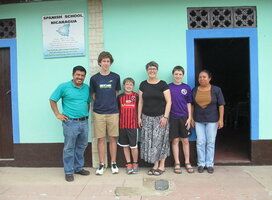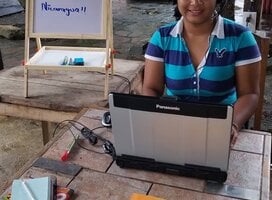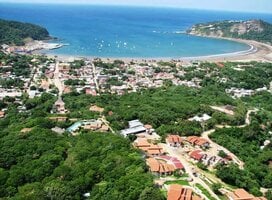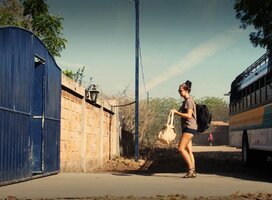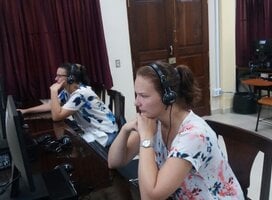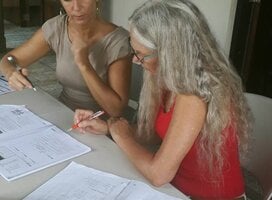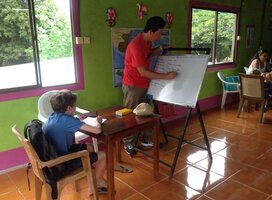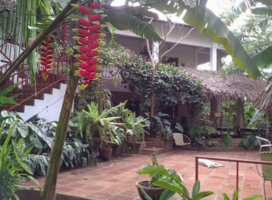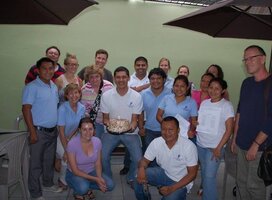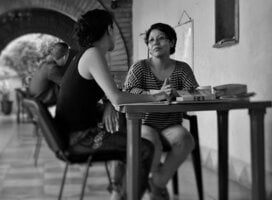Spanish Language Schools in Nicaragua
From primordial petroglyphs to the alluring Cocibolca, the world renown “land of lakes and volcanoes” offers an unparalleled journey into the heart of Central America. Shedding its post-80s revolutionary repute, Nicaragua has rapidly emerged as a fulcrum of international ecotourism, and welcomes many travelers who want to learn Spanish in Nicaragua every year.
Bordering Honduras to the north and Costa Rica to the south, Nicaragua offers an eclectic mix of language, culture, cuisine and everything in between -- albeit, without the price tag of its continental counterparts!
Indeed, girded by the Pacific Ocean, Caribbean Sea and Gulf of Fonseca, the nation's abundance of biologically significant and unique ecosystems make it an ideal location for any traveler looking to spice up their linguistic experience without breaking the bank!
A melting-pot of history, heritage and habitat, Mesoamerica’s hidden pocket is well and truly open for business!
Photo credits: nimdok.
Immersion programs
Whether you’re looking to become a monolingual master, hone your skills, or simply experience life in another country, cultural immersions offer an unparalleled opportunity to walk the walk and talk the talk right in the heart of Central America! Homestay programs are habitually run in association with regional language schools, and may cost anywhere between $250 - 400 USD per week.
University courses
With more institutions than ever offering study abroad and academic exchange programs, students seeking the most structured option are advised to consider a university-based language course. Though an intermediate level of Spanish is often required, travelers are afforded the opportunity to gain academic credit and work alongside their peers. Students are advised to contact their home institution for inquiries regarding financial assistance.
Private tutoring
Private tuition offers the most flexibility to travelers looking to combine education with fun, with classes offered alongside (or independent of) additional studies. Unlike its continental counterparts, private tuition in Nicaragua won’t break the bank, costing as little as $8 USD per hour!
Where in Nicaragua is best for you to learn Spanish?
Masaya
Dubbed "the Cradle of Folklore,” Nicaragua’s handicraft capital offers an eclectic mix of history, heritage and gastronomy -- a significant coup for any linguistic experience.
From ‘the Mercardo de Artesanias’ (craft market) and San Jeronimo fall fiesta, to the Volcan Masaya and Apoyo Lake, travelers are never short an opportunity to explore Nicaraguan culture! While you’re here, make sure to check out some of the cities world renown pre-Columbian cuisine, such as Nacatamal, Vaho, and yucca!
Leon
Founded by the Spaniards as Leon Santiago de los Caballeros, Nicaragua’s second largest conurbation boasts a wealth of architectural, historical and cultural landmarks -- not to mention some of the most esteemed language schools in the country!
Home to two UNESCO World Heritage Sites -- the Leon Cathedral and Ruins of Leon Viejo -- and the Telica Volcano’s world-renown hot springs, Leon epitomizes the “work hard, play harder” axiom.
Granada
Descending from a rich colonial heritage, Granada has been hallmarked as the first European city in mainland America -- a claim bolstered by the atavistic monuments and architecture lining the region.
Populated predominantly by a Spanish-speaking majority of Mestizos (natives), Granada offers travelers an unmatched opportunity to experience Nicaragua’s abundant history, language and culture deep in the heart of Central America! Notable sites include the Volcano Mombacho, Isletas of Granada and Ometepe (not actually in Granada, but easily accessible for a quick day or weekend trip).
So you’ve decided how and where you’ll learn Spanish in Nicaragua. Now it’s time for the real decision making to begin! From costs and duration to language prerequisites and visas, it’s imperative that travelers examine all options when selecting the right language program for them.
Highlights
- Did you know: Though the official language of Nicaragua is Spanish, many natives still speak some of the original Mayan Language that has been in the area for thousands of years!
- School’s out, let’s have some fun: Whether you’re surfing at San Juan del Sur, pondering petroglyphs or trekking volcanoes, travelers are never short an opportunity in Central America’s hidden pocket!
- Wow others with an idiom: “Cuando el indio se levanta y el chancho chilla, ya es de dia" - or, “when the Indian rises and the pig scream, it is day.” It’s translation? We wake up really early!
What visa do I need to learn Spanish in Nicaragua?
Travelers from the predominance of Western countries may stay in Nicaragua for up to 90 days without a visa, provided they have a valid passport, proof of sufficient funds ($200 USD) and an onward ticket. Please consult the Nicaraguan Foreign Ministry for additional information.
What cultural immersion activities are there?
Casa de Cultura (Houses of Culture) are commonplace throughout Nicaragua, and offer a multitude of artistic, theatrical and folkloric activities for as little as $1 USD per person. Though classes are generally conducted in Spanish, prominent tourist areas such as Granada and San Juan de Sur will often offer assistance in English.
Travelers visiting in January should take advantage of the Rio San Juan Carnival -- a local artisan celebration, attracting more than 17,000 people annually!
How much should I budget?
Though the best things in life may not come free, they certainly come close in Nicaragua! In juxtaposition to its continental counterparts, Central America’s hidden gem is a coup for the money conscious traveler. With intensive language programs (including homestay accommodation and daily meals) running for as little as $250 USD a week, Nicaragua offers the life of a King for the wage of a peasant.
Though the cordoba (referred to as a ‘peso’ or ‘real’ by locals) is Nicaragua’s official currency, US dollars are widely accepted due to fluctuating exchange rates.
